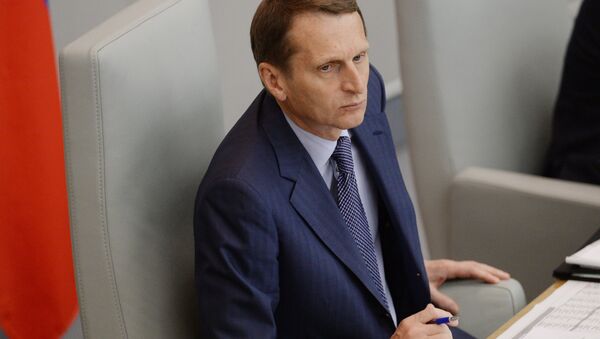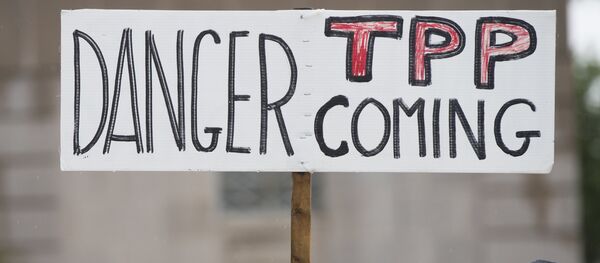GENEVA (Sputnik) — On October 5, twelve countries of the Pacific Rim, including the United States, reached an agreement on the wording of the TPP free trade deal, which, if ratified, would encompass about 40 percent of the global economy. TPP envisages significant trade deregulation between the United States, Japan, Australia, Brunei, Canada, Chile, Malaysia, Mexico, New Zealand, Peru, Singapore, and Vietnam.
"There are serious risks to the world posed by the recent Trans-Pacific Partnership agreement between the 12 countries. Right after its ratification by the parliaments, the 'controlling interest' in the policy of the region, covering about 40 percent of the global GDP, will go to the United States," Naryshkin said addressing the 133rd assembly of the Inter-Parliamentary Union in the Swiss city of Geneva.
Naryshkin added that the aim of the free trade deal is to empower Washington to dictate the rules of the global economy, citing US President Barack Obama.
After the TPP accord was agreed, Kremlin spokesman Dmitry Peskov said that Russia would analyze it in regard to its own national interests. He cited Russian President Vladimir Putin's warning, at the United Nations in late September, of the dangers that closed-door trade arrangements entail, including attempts to replace the mechanisms of the World Trade Organization and other international trade regulations.
The unusual secrecy surrounding the TPP negotiations, and the uncertain implications of the deal for workers’ rights, national sovereignty, employment, copyright and the environment have drawn heavy criticism from members of government, economics experts and the public.
While speaking about Russia's participation in the Parliamentary Assembly of the Council of Europe (PACE), Naryshkin said Russia would refuse to hold discussions within the Assembly, unless it brings back the spirit of democracy and freedom to its operations.
In April, 2014 PACE adopted a resolution, under which the Russian delegation was deprived the right to vote and the right to be represented in the governing structures of the PACE for a year, a decision later prolonged for another year. Such measures meant a mark of the West's disapproval and refusal to recognize the legitimacy of Crimea's joining Russia, and Moscow's alleged involvement in the Ukraine crisis.
Russia has denied the claims, and has not taken part in the work of PACE since the sanctions were applied.
"It is clear to us [Moscow] that if the PACE leadership… does not bring the spirit of democracy and the spirit of freedom back to the atmosphere of the Parliamentary Assembly, let the discussions and conversations take place without us," Naryshkin told reporters.
A Russian parliamentary delegation, led by Naryshkin, is participating in the 133rd Inter-Parliamentary Union (IPU) Assembly, which meets twice a year. This time, the lawmakers are negotiating the lifting of sanctions against parliamentarians, the situation in Syria, international law, as well as the refugee crisis, among other issues.
On Sunday, the IPU adopted a statement on the inadmissibility of the sanctions against lawmakers, also voicing its support for organizing international conferences only in countries, where there were no visa restrictions on parliament members.
In September, the Russian delegation canceled a visit to New York City to take part in the Fourth World Conference of Speakers of Parliament Convened by the IPU due to visa restrictions on Russian parliamentary speaker Valentina Matvienko.



